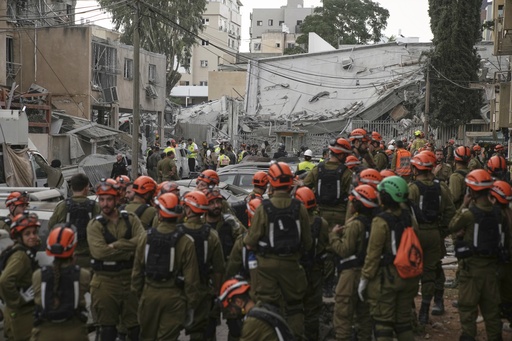President Donald Trump posted on social media urging immediate evacuation of Tehran, asserting that Iran must not possess nuclear weapons. This follows escalating tensions between Israel and Iran, with Israel warning residents in Tehran to evacuate due to impending airstrikes. Israeli forces have engaged in numerous airstrikes on Iran, including a direct hit on Tehran’s state-run TV during a broadcast. Iran responded with missile attacks on Israel, resulting in several casualties. The conflicts started over disputes regarding Iran’s nuclear ambitions, raising concerns of a potential broader regional conflict.
Israeli Prime Minister Benjamin Netanyahu claimed their strikes have significantly delayed Iran’s nuclear program and expressed regular communication with Trump. Meanwhile, leaders of the G7 nations called for de-escalation between Israel and Iran, reiterating that Iran should not acquire nuclear arms. The G7 emphasized Israel’s right to self-defense and highlighted the need to protect civilians. Trump’s administration adjusted the U.S. military presence to safeguard its interests as tensions rose.
In light of these tensions, President Trump plans to depart early from the G7 summit after completing trade discussions amid developments in the Middle East. The G7 statement called for peaceful resolutions, underscoring a ceasefire in Gaza. Simultaneously, airports have been shuttered across the region, causing widespread disruption. As aviation safety experts stressed the scale of these disruptions, Iran and its regional ally Hezbollah found themselves isolated. Iran faces difficulties in rebuilding its defense capabilities amidst these challenges.
Domestically in Israel, support for continued military actions against Iran remains high despite civilian displacement caused by missile attacks. Amidst international appeals for peace, Israel maintains it will not tolerate Iran’s nuclear progress. Reports indicate substantial internatl displacements within Gaza as Israeli forces clash with groups attempting to access new food supply points. Humanitarian groups condemned Israel’s strategies, pointing to the high civilian toll as the region grapples with worsening conditions.
Globally, the UN nuclear agency confirmed that while Iran’s nuclear site at Natanz had been struck, underground components remained intact. Still, Israel’s ambassador reinforced their stance, continuing operations in Tehran. Tensions magnified with new Israeli strikes in Tehran just as Netanyahu announced extensive setbacks to Iran’s nuclear program. Despite internal criticism, Israeli opposition rallied behind Netanyahu’s strategic decisions during this conflict.
Iran responded with strong criticism of Israel’s attack on its state TV station, labeling it a war crime, while calling for international attention. Iran’s Foreign Ministry decried these actions, emphasizing the severity of targeting journalistic institutions. As both sides prepared for potential further escalations, the complexity of aerial defense systems and logistical barriers emerged as critical topics among defense experts.
In response, numerous countries began evacuation protocols for their citizens from the conflict zones in Iran and Israel, highlighting the international concerns and diplomatic efforts underway. The conflict also prompted discussions around military interventions and the necessity of diplomatic dialogues led by global powers to de-escalate the situation. While some nations echoed calls for restraint and mediation, others highlighted Iran’s challenges in seeking necessary regional support, signaling an intricate geopolitical web influencing the trajectory of this conflict.



